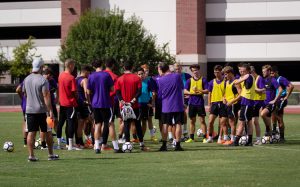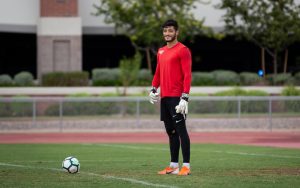- Slug: Sports-GCU Soccer International, about 1,100 words.
- Photos available
- Map https://infogram.com/gcu-international-soccer-1h984w7zdj9g2p3
By Christopher Lindsay
Cronkite News
PHOENIX – With a 34-man roster that includes 14 international players from 10 countries, Grand Canyon’s soccer team has turned diversity into a team strength, despite the challenges that come with a collection of players from different cultural backgrounds.
It’s no easy task. In addition to the United States, Grand Canyon has players from Cyprus, South Africa, Japan, Canada, Argentina, England, France, Ghana, Ecuador and Brazil.
Several of the Lopes cite English as their second or even third language. Working through the obvious linguistic and cultural barriers, GCU’s coaching and recruiting staff works hard to foster an inclusive atmosphere on and off the field.
“What we find is that by going international, we’re getting a diverse player or player that is really interested in being here,” coach Schellas Hyndman said.
And the program is becoming a popular destination for international players.
“It is amazing how much people reach out to us and actually show interest in our program and the recent success that we’ve had,” said Tim McClements, Grand Canyon’s associate head coach.
Although international players make up a sizable portion of the roster, Hyndman said Grand Canyon typically focuses on local recruits first. But he said that when the recruiting staff is “unable to recruit that key player that can help (us) maybe compete for a championship, then (we) need to go to other places.”
Hyndman said the process of recruiting international players is relatively simple.
“The first thing we want to do is make official contact with the players to find out if they are serious about coming to the states to play soccer, and getting their education,” he said.
The second step is assuring prospective players are eligible. Some are deemed ineligible by the NCAA based on the status of leagues they’ve played in internationally.
“The third thing is, we need to get a chance to see them play,” Hyndman said.
To that end, the GCU staff travels across the world to visit athletes and pitch them on the idea of joining the Lopes’ global program.
“I think the diversity is great, to have players on your team to bring different cultures, different experiences,” Hyndman said.
Two years ago, the team’s previous recruiting coordinator flew to Cyprus, an island country in the eastern mediterranean, to visit goalkeeper George Tasouris.
After hearing what GCU had to offer as a school and soccer program, Tasouris committed on the spot. He is one of three Cypriots on the team, along with midfielders Marios Andreou, who is a sophomore, and senior Pambos Aristotelous.
Tasouris said the presence of Aristotelous and Andreou makes Phoenix feel more like home.
“You want a person to talk to when no one else can understand you,” Tasouris said.
The coaching staff looks to Tasouris for leadership and as an example of how diversity can positively affect the morale and chemistry within the locker room.
While he is just a redshirt sophomore, Tasouris is one of the oldest players on the team and is someone Hyndman relies upon because of his maturity.
“He may be one of the top three goalkeepers I’ve ever coached in college and he’s very mature, he’s very physical,” Hyndman said of Tasouris.
Tasouris delayed his journey to GCU while serving mandatory service in the Cypriot National Guard for 18 months, an experience he cites as a catalyst for his leadership abilities.
“It really matured me because it gave me a gave me a sense of discipline that I didn’t have before that, even throughout the whole football thing,” Tasouris said. ”I think that it kind of prepared me to adapt and overcome any obstacle.”
His maturity showed during his first season with the Lopes, when he was named to the All-Western Athletic Conference second-team, the All-WAC freshman team and won Most Valuable Player honors at the WAC tournament when he didn’t allow a goal in three games as Grand Canyon won the championship.
“(George) was able to contribute and contribute at a major level right away, and that a lot of times is very difficult for a younger player,” McClements said.
Grand Canyon’s 14 international players must balance the unfamiliarity of life in the U.S. against their hunger to achieve goals and perform at a high level.
“It’s tough, but I’ve learned that you have to sacrifice to get what you want,” he said. “I’m in the path of sacrificing right now because I want to have a great future, so I’m kind of setting that aside.”
Adjusting to a complete change of lifestyle has a unique impact on each individual.
Freshman Hugo Logan, a midfielder from Hertfordshire, England, a county located about 30 miles north of London, said acclimating to Arizona’s heat was the toughest adjustment to make.
“It took me awhile to get used to. I came out a month early to get used to it,” Logan said.
Tasouris agreed that the change of weather is a challenge.
“Where I come from… it’s a bit more humid, so you can sweat a bit and cool down, but the first days that we came (to Phoenix) it was like… you could boil an egg,” Tasouris said.
In addition to the blazing heat, international players have to adjust to rules that are different in the NCAA than what they were used to in their home leagues.
“They aren’t playing NCAA soccer anywhere else but here,” Hyndman said, “The numbers of substitutions, the number of games back-to-back, it really takes a lot out of these players.”
Hyndman said it usually takes international players a season to adjust.
International rules dictate that substitutions are to be limited to three per game, and a player who is subbed out cannot re-enter the game.
The NCAA is less restrictive when it comes to substitutions. It allows coaches to substitute up to 11 players at one time, with each player given one opportunity to re-enter. It is a substitution policy that allows players to play more aggressively.
“The style of play is different, and the intensity is a lot different as well,” Logan said.
Also, the college season is more condensed, with the regular season beginning in August and concluding in November. The tight scheduling leads to multiple games in the span of a week or even a weekend, which is much busier than in some of the international leagues.
“It was a big difference to get in the mood for it, but I think once we got a couple of games passed through, we adapted to it to a point,” Tasouris said of the rules differences.
Despite their diverse backgrounds, the Lopes share common goals. They are aiming to win another WAC championship and the conference’s automatic bid to the NCAA tournament.
“We have a good team, we have a good fighting spirit,” Tasouris said. “We are a family, we show that on the field every time. I think if we stick together… we can accomplish a lot of things both individually and as a collective group.”
For more stories from Cronkite News, visit cronkitenews.azpbs.org.

